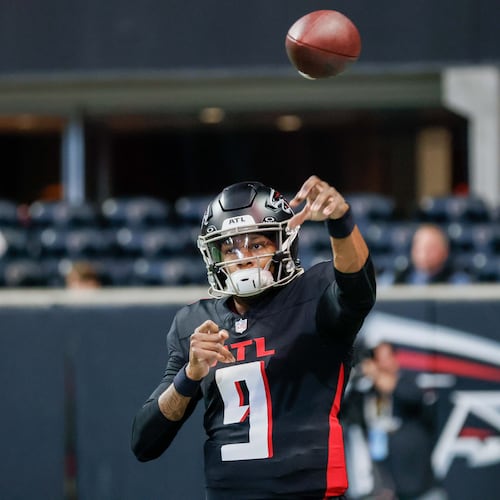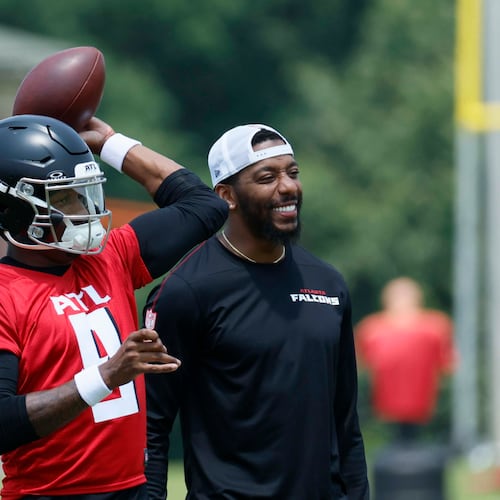There being no way to sugarcoat 4-12, we must concede that the Falcons are coming off a bad season. But having one bad season isn’t necessarily the same as being in bad shape. As a fairly important NFL draft approaches, we offer reasons why this suddenly losing team might not be losing much longer.
They have a good general manager, a good coach and a good quarterback. Some among you might quibble with one or more of those assessments, but let's face facts: When last the Falcons were 4-12, they lacked all of the above. They hired Thomas Dimitroff as GM, and he hired Mike Smith and drafted Matt Ryan No. 3 overall. Five winning seasons ensued, and only one of those was of the nosing-above-.500 variety. The Falcons won 10 or more games in 2008, 2010, 2011 and 2012. Over those five seasons, they won more games than any NFC team. You don't win for five seasons without knowing what you're doing. (Maybe for a season or two, but not five.) Those three men remain in place. In the NFL, that's called a foundation.
Those three men and all around them have been re-energized. Outside-the-box thinkers counsel that the time to change is when you're succeeding, but there's a reason such advice tends to stay outside the box. It flouts both human nature and common sense. Change comes easier in the wake of failure, and the Falcons went five seasons without failing. (No, they didn't win the Super Bowl, but they made the playoffs four times in five, which meant they kept giving themselves the chance to win the Super Bowl, which from an organizational standpoint is all you can hope.) Losing focuses the mind in a way winning never can. The Falcons got away with playing substandard defenses for most of those five seasons, and eventually the offensive line began to wither, but Ryan was so good in close games that it didn't much matter. It mattered last season because the Falcons started losing those close games. Which brings us to …
If good luck doesn't hold forever, neither does bad. When a team wins a disproportionate number of close games, those who track advanced analytics tut-tut that such success isn't sustainable. Fact is, the Falcons sustained their run for five seasons, going an off-the-charts 29-12 in one-score games. The other shoe finally dropped in 2013. They suffered four one-score losses in the season's first five weeks. (They would finish 4-7 in such affairs, the first time with Ryan as their quarterback they've been below .500.) Couple those jarring early results with a raft of early injuries, and the season was all but ruined by Columbus Day. That confluence of woe isn't apt to recur soon.
Having the sixth overall pick affords the chance to get better without wrecking the rest of the draft (or two drafts). The trouble with consistent winning is that you're always drafting too late to expect to land makers of immediate impact. From 2009 through last April, the Falcons drafted only one man higher than 19th overall, and that man — receiver Julio Jones — cost them five picks over two drafts. The Falcons might not hook the pass rusher Jadeveon Clowney at No. 6, but they'll surely be positioned to get a left tackle or a swift linebacker, and they could use either one. And say what you will about Dimitroff's draft history, but the two best players on this roster are Ryan and Jones, who were the only picks among a draft's top six this GM has made.
The NFL is the realm of the quick turnaround. The Indianapolis Colts improved from 2-14 to 11-5 after drafting Andrew Luck in 2012. The Washington Redskins improved from 5-11 to 10-6 after drafting Robert Griffin III the same season. The Kansas City Chiefs surged from 2-14 to 11-5 after hiring Andy Reid. Those examples don't quite fit here, seeing as how the Falcons aren't changing head coaches or quarterbacks, but two NFC South examples do. Last season the Carolina Panthers rose from 7-9 to 12-4 simply by playing better football, and the graph of the hated Saints offers even more hope. New Orleans were 13-3, 11-5, 13-3 and then — minus the suspended coach Sean Payton — slid to 7-9 in 2012. Last season, the Saints were themselves again, and they finished a Saints-like 11-5.
If the Falcons do their offseason work well and they don’t get as unlucky as they did in 2013, there’s no reason they can’t spring from 4-12 to 10-6. If 2013 revealed the Falcons as being not quite as good as they (or we) had hoped, 2014 could prove that they’re not half as bad as they just looked.
About the Author
Keep Reading
The Latest
Featured



